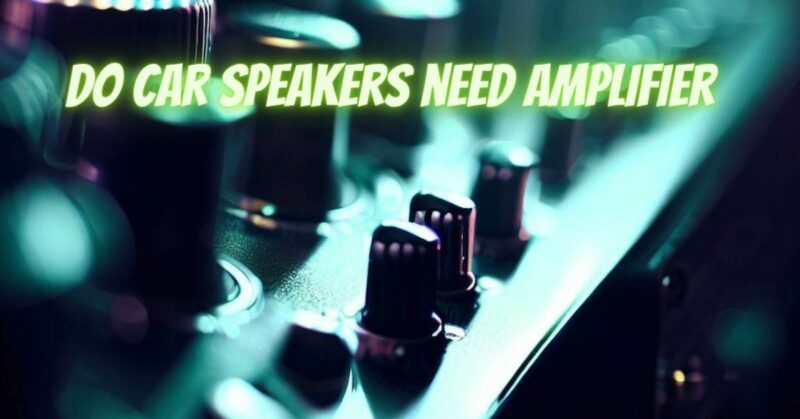When it comes to enhancing your car audio experience, the decision to invest in an amplifier can be a game-changer. While factory-installed car audio systems often come with built-in amplification, adding an external amplifier can bring significant improvements in sound quality, power, and overall performance. In this article, we’ll explore the benefits, considerations, and scenarios where adding an amplifier to your car speakers can elevate your driving soundtrack to a whole new level.
Understanding Car Speakers and Amplifiers:
Car speakers are the crucial components responsible for reproducing sound in your vehicle. They cover a range of frequencies, from lows to highs, creating a balanced audio spectrum. Amplifiers, on the other hand, provide the power needed to drive speakers effectively, resulting in clearer, louder, and more dynamic sound.
Benefits of Adding an Amplifier to Car Speakers:
- Power Boost: Factory head units often provide limited power to car speakers. An external amplifier delivers more power, allowing your speakers to reach their full potential and produce higher-quality sound.
- Enhanced Sound Quality: Amplifiers reduce distortion and provide clean, detailed sound reproduction across different genres of music. This results in improved clarity and fidelity.
- Dynamic Range: Amplified speakers can accurately reproduce both quiet and loud passages in music, ensuring that no detail is lost even during dramatic audio shifts.
- Bass Response: Adding an amplifier can enhance the bass response of your car speakers, delivering impactful low frequencies that add depth and immersion to your audio.
- Sound Customization: Amplifiers often come with adjustable settings, enabling you to fine-tune the sound to match your preferences and the acoustics of your vehicle.
Considerations When Adding an Amplifier:
- Speaker Quality: Before adding an amplifier, assess the quality of your car speakers. High-quality speakers will benefit more from amplification, resulting in a noticeable improvement in sound.
- Head Unit Compatibility: Check whether your head unit has preamp outputs or is compatible with external amplifiers. Some head units might require additional adapters or modifications.
- Wiring and Installation: Amplifier installation requires proper wiring and expertise. It’s recommended to have the installation performed by a professional to ensure optimal performance and safety.
- Speaker Match: Choose an amplifier that matches the power handling and impedance rating of your speakers. Mismatched components can lead to sound quality issues or speaker damage.
- Budget: Amplifiers come in various price ranges. Consider your budget and the overall investment you’re willing to make in upgrading your car audio system.
Scenarios Where Amplifiers Shine:
- Aftermarket Speakers: If you’ve upgraded to higher-quality aftermarket speakers, an amplifier can provide the power they need to shine and deliver superior sound quality.
- Lack of Bass: If you feel that your current speakers lack bass impact, an amplifier can improve low-frequency response and add depth to your audio.
- Loud and Clear Sound: If you enjoy listening to music at higher volumes without distortion, an amplifier can ensure that your speakers maintain clarity and accuracy.
Adding an amplifier to your car speakers can elevate your driving experience by delivering more power, improved sound quality, and enhanced clarity. Before making a decision, assess the quality of your speakers, the compatibility of your head unit, and your budget. While amplifiers can significantly enhance your audio system, it’s essential to ensure proper installation and consider the synergy of your components to achieve a balanced and satisfying sound signature on the road.


